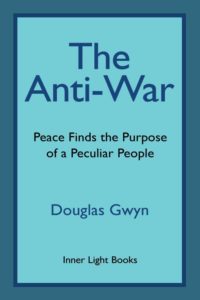The Anti-War: Peace Finds the Purpose of a Peculiar People
Reviewed by Paul Buckley
April 1, 2017
 By Douglas Gwyn. Inner Light Books, 2016. 208 pages. $30/hardcover; $17.50/paperback.
By Douglas Gwyn. Inner Light Books, 2016. 208 pages. $30/hardcover; $17.50/paperback.Buy from QuakerBooks
Doug Gwyn may have given more thought to the environment that incubated the earliest Friends than any other Quaker. In The Anti-War’s two interrelated essays, he digs down to the roots of our peace testimony and lays bare the ways in which it has evolved over the past 350 years. Each section is built on a section of scripture. The first essay, “Peace Finds the Purpose of a Peculiar People,” examines 1 Peter 2:4–17—one of the sources of early Friends’ claim to be a “peculiar people”—the second, “Militant Peacemaking in the Manner of Friends,” explores the significance of the Book of Revelation for the Children of Light. Don’t let yourself be put off by his use of the Bible; it illuminates the unique calling we have to model a society that is more than merely against war. Gwyn demonstrates that Friends are—or could be—the Anti-War.
First, a couple of definitions. In the King James Version, I Peter 2:9 is translated, “But ye are a chosen generation, a royal priesthood, an holy nation, a peculiar people . . .” In contemporary versions, instead of “a peculiar people” you will find “a people belonging to God.” The first Friends believed this verse referred to them. They belonged to God. They were called by God to fulfill a peculiar (i.e., God-chosen) role in this world—to live in peaceful relationships with each other and the rest of creation. This meant not merely forswearing violence; it was a life of total covenant faithfulness with Creator and all creatures—a model of interaction that is by its nature completely devoid of force and coercion. Violence does not have to be weeded out. It cannot grow in this soil.
Today, pacifism is frequently propounded as an ethical imperative—a superior philosophy that would yield practical benefits if only everyone would adopt it. This is very different from the situation of both the first Christians and the first Quakers. They embraced the consequences of covenant faithfulness. The surrounding cultures knew implicitly that this utterly rejected the bases of their civilization. Both peoples were rejected and persecuted, becoming internal exiles in their homes. “Their plea was no naïve plea to ‘give peace a chance.’ It was an apocalyptic unmasking of the machinations of worldly power, corruption, injustice, and violence . . . and advanced through revolutionary patience and suffering.”
The Anti-War is not something unseen to wish for. It is not practical or an effective plan to achieve a realizable goal. It is an alternative template for living in a society that is blind to alternatives. It will puzzle and offend others. It does not react to each new provocation with thoughtful and relevant answers. It dares us to stand still in the Inward Light until we can see clearly.
I read this book in September 2016 and again after the November elections. Seeing the reactions of my Friends to those elections made it clear the degree to which many Quakers identify building the kingdom of heaven with the platform of one American political party. This book can be an inoculation against that condition. It reveals the spiritual and religious bases of our testimony against war. It can help you find your purpose as one member of a peculiar people.
Click to share on Facebook (Opens in new window)
Click to share on Twitter (Opens in new window)
